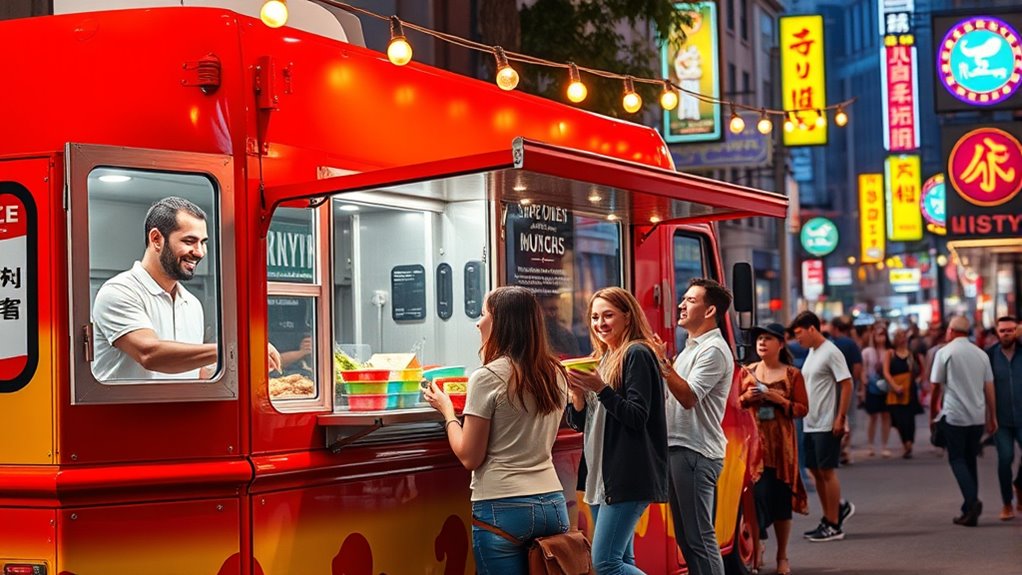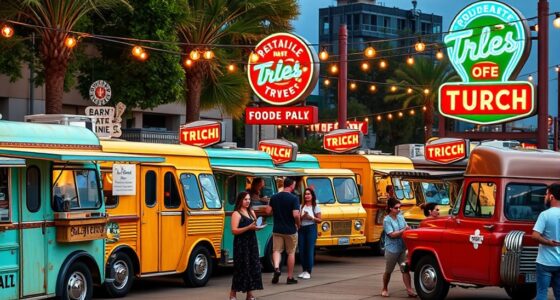Many successful food truck owners share stories of overcoming early financial hurdles by mastering pricing, building strong supplier relationships, and managing expenses. They find their niche by innovating menus tailored to customer preferences and dietary needs, helping them stand out. Building a loyal community happens through social media, local events, and consistent engagement. They navigate complex regulations by staying informed and compliant. If you keep exploring, you’ll uncover more inspiring insights on growing your food truck journey.
Key Takeaways
- Successful owners share how strategic pricing and expense management built a strong financial foundation.
- They highlight the importance of niche menu innovation and adapting to customer feedback.
- Many emphasize community engagement through social media and local events to grow loyal customer bases.
- Navigating regulatory challenges and securing permits were common hurdles overcome with proactive communication.
- Scaling stories reveal the significance of fleet management, branding, and securing funding for expansion.
Overcoming Early Financial Hurdles
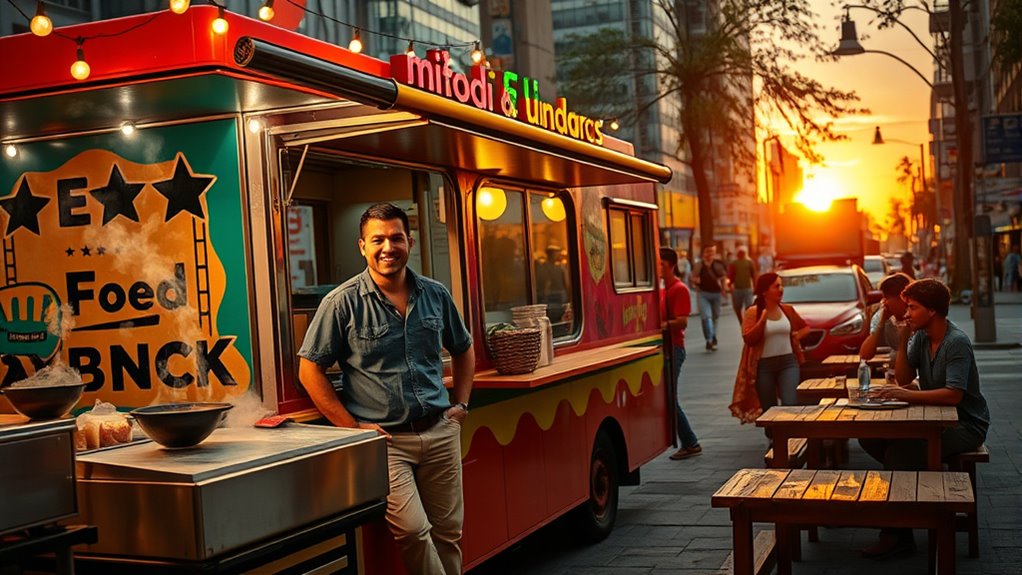
Starting a food truck business often means facing significant financial challenges early on. To manage costs, you need effective pricing strategies that balance affordability with profit margins. Carefully analyzing your expenses helps you set prices that attract customers without sacrificing quality. Building strong supplier relationships also plays a vital role; reliable suppliers can offer better deals and flexible payment terms, reducing cash flow strain. Negotiating for discounts or bulk orders can lower ingredient costs, freeing up funds for other essentials like marketing and equipment. Staying disciplined with your budget, regularly reviewing your pricing, and nurturing supplier partnerships enable you to navigate initial financial hurdles. These strategies help establish a stable foundation, so you can focus on growing your business confidently. Paying attention to payment processing options can further streamline transactions and improve customer satisfaction.
Finding the Right Niche and Menu
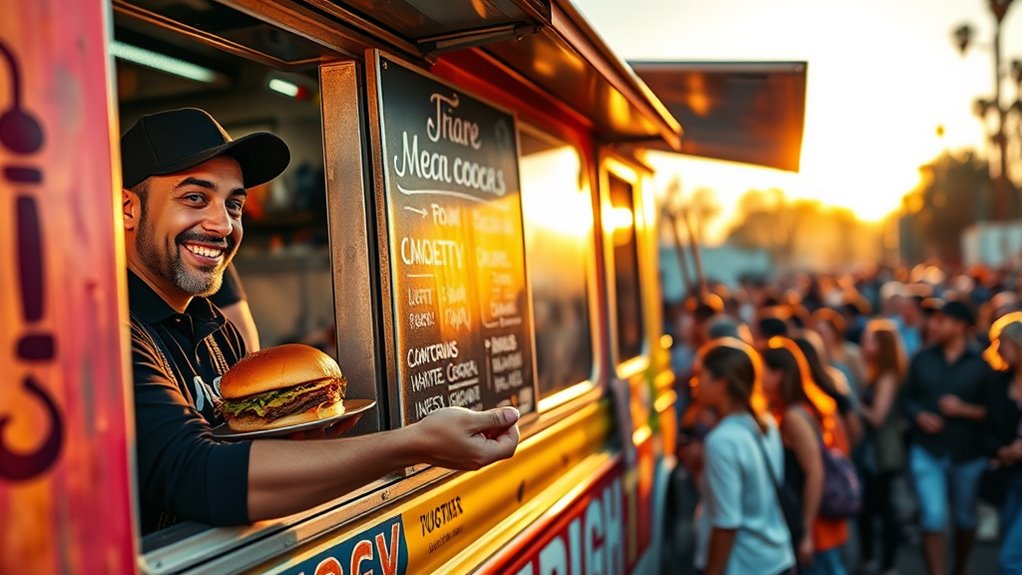
Choosing the right niche and menu is essential for standing out in a competitive food truck industry. To succeed, focus on menu innovation that appeals to your target demographics. Here are four key steps:
- Identify your target demographics’ preferences and dietary needs.
- Experiment with unique dishes that set you apart from competitors.
- Keep your menu flexible to adapt to trends and customer feedback.
- Balance innovation with consistency to build loyal customers.
Building a Strong Customer Community
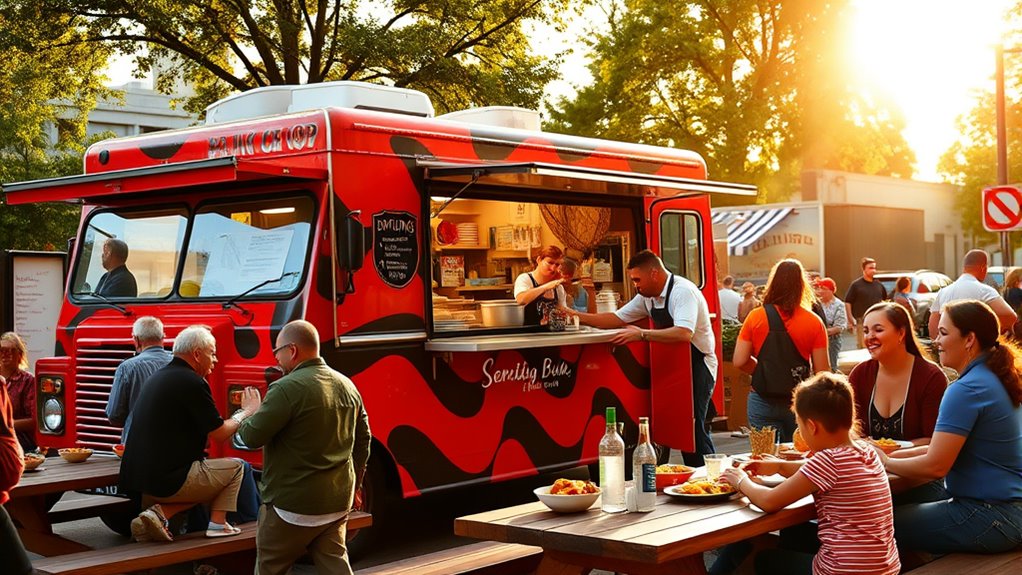
Creating a loyal customer community starts with maintaining an engaging social media presence that keeps people excited about your truck. Participating in local events also helps you connect directly with your neighborhood and build relationships. When you combine these efforts, you’ll foster a strong, lasting bond with your customers. Being aware of herpes signs can help you better understand health concerns that might affect your team or customers.
Engaging Social Media Presence
A strong social media presence can substantially boost your food truck’s visibility and foster a loyal customer community. To do this effectively, focus on:
- Sharing eye-catching food photography that highlights your dishes’ appeal.
- Using hashtag strategies to reach local audiences and food enthusiasts.
- Posting consistently to keep followers engaged and excited about your location.
- Responding promptly to comments and messages to build relationships.
- Incorporating content strategy techniques to maintain a dynamic and engaging online profile.
Participating in Local Events
Participating in local events is one of the most effective ways to build a strong customer community around your food truck. Food festival strategies can help you stand out and attract new loyal customers. Focus on engaging attendees with eye-catching signage, sampling opportunities, and friendly interactions. Use event marketing tips like pre-event promotion on social media and offering special discounts for event attendees. Be sure to network with other vendors and organizers to maximize exposure. Your presence at these events not only boosts sales but also creates memorable experiences that turn first-time visitors into regular customers. Consistent participation helps establish your truck as a staple in the local foodie scene, strengthening community ties and encouraging word-of-mouth growth. Additionally, understanding the lifestyle factors that influence community engagement can further enhance your success at these events.
Navigating Regulatory and Licensing Challenges

Guiding the complex landscape of regulations and licensing is one of the biggest hurdles food truck owners face. You need to navigate strict health inspections, zoning laws, and permits that vary by location. Here’s what you’ll encounter:
- Understanding local health inspections to meet sanitation standards.
- Complying with zoning laws that dictate where you can park and operate.
- Securing permits for each city or county you serve.
- Staying updated on evolving regulations to avoid fines or shutdowns.
These steps can be time-consuming but are essential for legal operation. Clear communication with local authorities and diligent research help you stay ahead of licensing challenges, ensuring your food truck runs smoothly and legally.
Scaling Up: From One Truck to a Fleet

Expanding from a single food truck to a fleet requires careful planning and strategic growth. You’ll need to master fleet management to coordinate schedules, maintenance, and staffing efficiently. As your fleet grows, tracking performance and customer feedback becomes essential to maintain quality across all trucks. Consider franchise opportunities to accelerate your expansion, but guarantee you establish consistent branding and operational standards. Developing a clear growth plan helps you identify the right timing and locations for new trucks. You’ll also need to secure additional funding and resources. Building a strong operational foundation now will make scaling smoother, allowing you to manage multiple trucks effectively and capitalize on new markets. With careful management, your single truck can evolve into a thriving fleet. Incorporating smart marketing strategies can further enhance your visibility and attract more customers as you expand.
Lessons Learned From Unexpected Obstacles
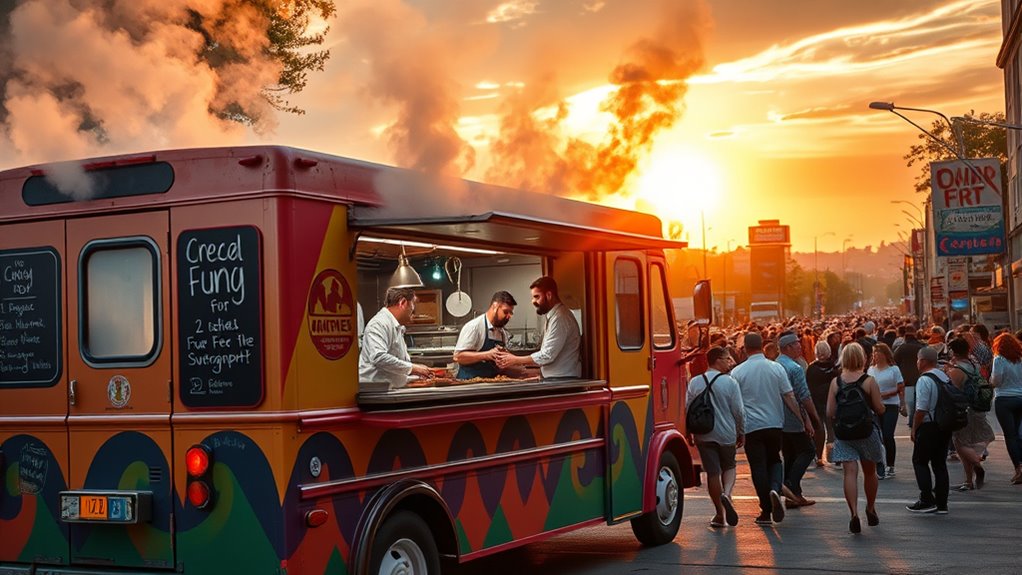
Unexpected obstacles can catch even the most prepared food truck owners off guard, teaching valuable lessons in resilience and adaptability. When ingredient sourcing becomes unpredictable, you learn to build relationships with multiple suppliers and keep backups ready. Staff management challenges, like sudden absences or miscommunication, teach you to cross-train team members and improve communication systems. Here are some lessons:
- Stay flexible with ingredient sources to avoid shortages.
- Develop a reliable team through cross-training.
- Communicate clearly to prevent staff confusion.
- Keep contingency plans for equipment or supply failures.
- Maintaining well-being and stress management techniques can help you stay focused and resilient during stressful times.
These obstacles push you to refine your operations, making your business more resilient and better prepared for future surprises. Embracing these lessons ensures you grow stronger despite setbacks.
Frequently Asked Questions
How Do Successful Owners Handle Staffing and Employee Retention?
You handle staffing and employee retention by prioritizing staff training to guarantee everyone feels confident and valued. You also implement employee incentives like bonuses or flexible schedules to keep your team motivated. By fostering a positive work environment and recognizing their efforts, you reduce turnover and build loyalty. This approach helps you maintain a reliable crew that delivers great service, keeping your food truck thriving and your customers happy.
What Marketing Strategies Are Most Effective for Food Truck Visibility?
To boost your food truck’s visibility, focus on social media to engage with your community and showcase your menu. Share eye-catching photos, updates on your location, and special offers regularly. Additionally, build local partnerships with nearby businesses or event organizers to increase exposure. These strategies help attract new customers and keep your current ones coming back, ultimately growing your reputation and sales.
How Do Owners Manage Supply Chain Disruptions?
You manage supply chain disruptions by focusing on solid inventory management and maintaining strong supplier relationships. Keep a close eye on your inventory levels to anticipate shortages early. Build good rapport with multiple suppliers to avoid dependency on a single source. Stay flexible with your menu options, and communicate promptly with suppliers during disruptions. This proactive approach helps you adapt quickly, ensuring your food truck stays stocked and operational.
What Are the Key Factors in Choosing Profitable Event Locations?
Imagine your food truck as a magnet, drawing crowds to the most profitable event locations. To do this, you need sharp pricing strategies and active community engagement. Scout spots with high foot traffic and vibrant events, like festivals or markets, where your flavors can shine. Engage with locals beforehand, build relationships, and tailor your offerings. These factors turn each location into a bustling hub, maximizing your profits and building loyal customers.
How Do Owners Innovate Their Menu to Stay Competitive?
You can stay competitive by focusing on menu innovation through flavor experimentation. Try introducing unique ingredients or fusion dishes that excite your customers’ palates. Keep a close eye on food trends and customer feedback, then adapt quickly. Offering seasonal specials or limited-time items also keeps your menu fresh and engaging. By continuously innovating your menu, you not only attract new customers but also build loyalty among your existing base.
Conclusion
If you believe success is just luck, think again. These stories prove that with passion, persistence, and adaptability, you can overcome tough obstacles and turn your food truck dreams into reality. Every challenge is an opportunity to learn and grow. So, trust that your hard work and resilience will pay off—because, in many cases, the only thing standing between you and success is believing you can make it happen.
